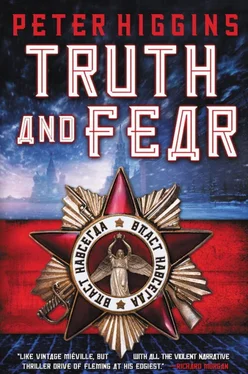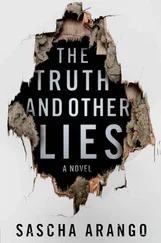They came out into a huddle of warehouses, wharves and jetties. Boats crowded against the harbour edge, idle under a covering of snow. The River Purfas was a pale green porridge of slush and fragments of ice. Rigging clattered in the brisk river breeze. Nets were draped, black and reeking, from the weather-bleached warehouse walls, and the smell from gibbeted racks of drying fish and smokehouses hung heavy on the air. Yellow-eyed seabirds called from canted masts and rooftops, swooped on scraps and stalked the walkways, poking at the chum-buckets. Chalk-boards at the wharfside fish market promised eel and crab, flounder, zander, garfish, herring, bream and cod. But fishing was done for the winter. Harder times were coming. The market trays were empty, the sawdust swept and the shutters up. Men hung about, smoking, talking quietly in the throaty, fricative languages of the raion.
Lom and Maroussia picked their way between stacked baskets, salt barrels and coils of rope. They found the tall narrow building where Kamilova lived at the far end of the wharf, squeezed between a chandlery and a smokehouse. A frontage of overlapping timbers of tar-black pine and dark lopsided windows with many panes of thick green glass. Maroussia knocked. Lom pulled his woollen cap lower over his forehead.
The woman who opened the door must have been sixty years old, but she was tall and straight and wiry-muscular, with a traveller’s sparse, defined, weathered face. Iron-grey hair, tied severely back. Bright pale intelligent eyes. She was wearing a knitted sweater, dark canvas trousers, boots.
‘Eligiya Kamilova?’ said Maroussia.
‘Yes? Who are you?’
‘My name is Maroussia Shaumian.’
‘Shaumian?’ Kamilova studied her with narrowed eyes. ‘I see. Shaumian .’
‘Can we come in? We want to talk to you. We want to ask you about the forest. I think you can help me—’
‘No,’ said Kamilova. ‘I can’t help you.’
She began to close the door. Lom stepped forward and leaned against it.
‘We need to talk to you,’ he said.
Kamilova looked at him steadily.
‘You,’ she said, ‘should get off my door.’
‘We just want to come in for a while,’ said Lom. ‘To talk. That’s all.’
‘I said get away from my door.’
Kamilova’s eyes widened. There was a strangeness there. Wild distant spaces. Lom felt the air stirring. Responsive. Forest smells. Resin and earth. And suddenly the air around him was no longer stuff to breathe, it was his enemy. Heavy in his lungs, hard and cold about him. A stone fist of air punched him in the back of the head, sickening, dizzying, and he stumbled forward. The weight of solid air on his shoulders and back pressed down on him. All the mile-high heaviness of the air. Forcing him to his knees. A sudden wind whipped the snow from the ground. It smacked and scraped at his face, a bitter freezing hail, blinding him. He could hear Maroussia somewhere far away, shouting, but the wind destroyed her words. Panicking, he struggled for breath. He could not fill his lungs. He was drowning in the hostile air.
But he did not drown. There was a sentience in the air. It was alive and knew what it was doing. And he knew what it was.
Lom reached out towards it. Opening himself. Taking the barriers down. Not breathing in but breathing out. Remembering.
He was in the centre of a small hardened whorl of fierceness, but beyond it were oceans of atmosphere. Eddies and tides and deeps, layer over layer, air from the forest, air from the river, air from the sea, freighted with life and scent and the stories of themselves. He climbed higher. The air grew thinner, colder, clearer, more beautiful, bright and electric the higher he climbed. He opened himself to it. He was air himself, air in the air. The squalls that battered him were part of him and he was in them. He let them pass through where he was. He rose and stood and waited patiently for the assault to calm and stop.
Kamilova was looking at him with surprise and frank curiosity. And something else. Lom could not tell what it was. It might have been recognition.
‘Who are you?’ she said.
Lom tried to answer but found he could not. Not yet. His heart was hammering. He needed all the capacity of his aching lungs to breathe, tearing mouthfuls of breath out of the sparse, thinned air.
‘Who is he?’ Kamilova said to Maroussia. Urgently. ‘Who is this man?’
‘This is my friend. His name is Vissarion.’
Kamilova frowned.
‘No,’ she said. ‘No. Not Vissarion. That’s not a forest name. He’s strong, but I didn’t know him. He carries himself like a bear, but something’s not right.’
‘Can’t we just…’ Lom breathed painfully. His whole body felt bruised and abused. ‘Can’t we just come in?’
Look to the south of Mirgorod and see hundreds of miles of frontierless grass. Sandy soil. Marshes and small lakes, slow yellow rivers, thorn thickets and sparse scatterings of birch. Collectivised farms of drab herds, two-strand fences, cabbages and potato fields. Hapless towns, dirt roads and one-platform railway halts. A long indeterminate coastline of gravel and mud. A country without features.
Across this country war is coming.
Onward the enemy’s armies churn, at the pace of markers being moved across a map in an operations room, at the speed of terse conversations on field telephones, converging on Mirgorod, capital of the Vlast. The armies of the enemy find the opposition melting away.
It is a matter of machine logistics now. Statistics and arithmetics of steel. A calculation of armoured divisions. The sound is the sound of diesel engines droning and the clatter of iron tracks, the rattle of ammunition belts, the thunder-crash of heavy guns. The smell is the smell of hot oil and hot metal, the burning of rubber, the hot piss the gunners use to cool their overworked weapons. The light is the light of arcing sprays of burning gasoline, the flicker of rocket batteries firing, the daytime darkness of shadows under smoke-filled air. Not in one place, but in a hundred places: five separate fronts, all rolling forward, thirty or forty miles a day, converging on Mirgorod.
In rain-sodden fields and bypassed towns, people stand mute and look on as the logarithms of steel, too intent on the future to notice them, surge by. Seventy-ton tanks chew up the ground. The pale faces of motorised infantry stare back at the watchers without expression from the back of armoured half-tracks. Under the watchers’ feet the earth trembles. The deep geologies of history are upheaving. The maps by which they have always lived are being torn up and trodden into the mud. The old certainties are dissolving like bones in an acid bath.
The ones who look on are not even frightened yet.
And over their heads the featureless sky is marked out with the high patchwork geometries of aircraft formations sliding north towards Mirgorod.
Lom followed Maroussia and Eligiya Kamilova up the staircase to Kamilova’s room. It was a wide, airy, almost empty space at the top of the house: the scent of woodsmoke and damp earth mixed with the harbour reek. Thick leaded panes filtered the morning light, and harbour sounds drifted in through an open casement. The room was austere, like the woman herself. Stripped back. Only what was essential. Bare floorboards darkened with age. A large rug spread in the centre, leather cushions and bolsters ranged around the edge. A pair of low, carved stools.
A small fire was burning in the corner, logs stacked neatly nearby: the logs looked like they’d spent time in the sea. A bleached animal skull rested on the floor near the hearth. It was big like an elk but broad-browed and feline, with front-facing eye sockets and a pair of long curved incisors. A hunting beast. It was enormous. Colossal.
Читать дальше


![Кэмерон Доки - Правда и ее последствия[Truth and Consequences]](/books/79610/kemeron-doki-pravda-i-ee-posledstviya-truth-and-con-thumb.webp)









